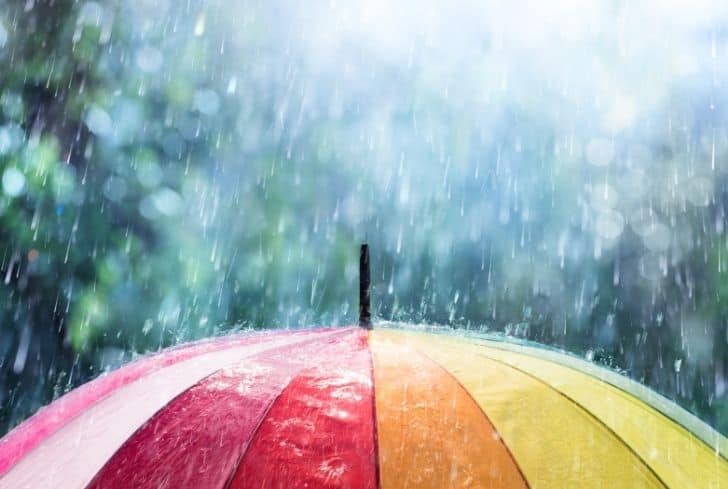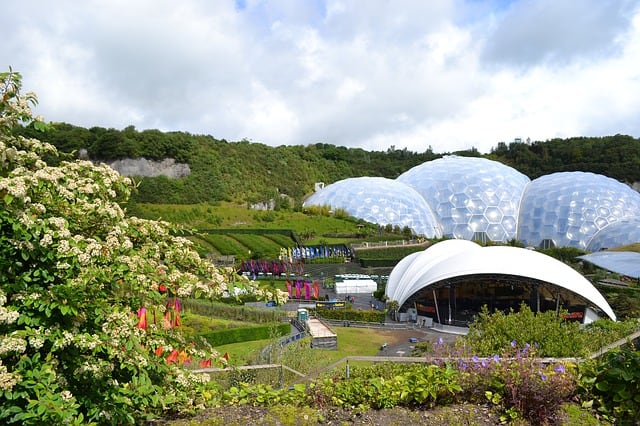Is Rainwater Good For Bathing? (And Drinking?)

There are different sources of water, and rainfall is one of the sources of water, and in some parts of the world, it is the major source. Many people have not tried collecting rainwater for household use. For some people, the only time they would have gotten wet from rainwater is if they were caught in a rainstorm.
In reality, rainwater is cleaner than most other sources of water we use. It is natural, and the only contaminations are dust in the atmosphere, which after a while are cleared up. There are no downsides or effects of using rainwater to bathe as some think.
Rainwater has many benefits to the human body, and there seems to be little awareness of these benefits. This is why people do not collect and store rainwater for use. Rainwater is also the cleanest and free source of water available. Instead of using recycled water, you can opt for rainwater once in a while.
When it rains, the water penetrates to the ground and becomes a part of lakes and rivers, known as groundwater. If rainwater is not preserved, the groundwater resources are constantly replenishing, leading to water scarcity.
In places where continuous rainfall happens, people can save the excess water and use it differently. The entire system of storing the rainwater and using it for the future is known as rainwater harvesting.
If you are waiting to discover more about rainwater, how you can use it, and whether it is safe for bathing, you must read this article.
Can Rainwater Be Used For Showers?
People who harvest rainwater to use at home use it for common household purposes like cleaning, washing, and flushing the toilet.
Only a few people use it to shower because many believe rainwater is unhealthy and can cause infections when used. We will see if this is true and whether you should use rainwater for showers.
Yes, you can use rainwater for showers; it is a great and cheap alternative to tap water, in addition to its many health benefits. Rainwater is the purest and uncontaminated source of water, there are no added chemicals, and it is free of toxins like chlorine and fluoride.
Rainwater is soft, so there are fewer minerals dissolved in it; this type of water has a lot of benefits on the human body. Soft water is great for human hair; it has an alkaline pH and is free from heavy metals; this quality promotes hair growth and keeps the hair strong. Rainwater also helps the skin maintain its moisture and elasticity.
Since rainwater is alkaline, it will do a good job washing off impurities and dirt from your scalp. So, showering with rainwater regularly will revive, freshen up, and make dull hair look glossy. If you have sensitive skin, taking a shower with rainwater will reduce all the symptoms and reactions caused by using hard water.
Soaps and detergents are more effective when used with soft water, like rainwater. You will create a great lather that you can use to get yourself clean; you do not even need that much lather to be clean. This is the same result you get from rainwater to wash clothes and dishes.
The most important thing to do is to find a perfect way to harvest rainwater, and you install a filter into it to ensure you use only clean water for all your household purposes. It is not necessary to treat harvested rainwater before using it because you would alter some of the qualities of the water.
Is Rainwater Clean?
The benefits of rainwater are unbelievably underrated. If more people know these and switch to use rainwater, there will be a reduced impact on the environment. The false assumption that rainwater is unclean has made people not know the benefits. We will debunk this false assumption.
Rainwater is clean; in fact, it is the cleanest source of water on our planet, cleaner than tap water, distilled water, well water, spring water, and other types of water. This does not mean rainwater does not contain impurities; it does, but not in the same quantity as other forms of water.
When rain falls, dirt and contaminants in the atmosphere make rainwater impure. Leaves, wind-blow dirt, insects, contaminated litter on the catchment areas, as well as fecal droppings from animals and birds are the most common rainwater contaminants.
Another thing that contaminates rainwater is poor storage. Poor hygiene in storing rainwater is bad and makes the water unfit for use. Most times, roofs are used as catchment areas for harvesting rainwater, and the type of roof used can also contaminate the water.
The most common roofing materials used are concrete or clay tile, metal, slate, wood shingle, and asphalt or composite shingle. The water will be contaminated when you have an asphalt or composite shingle catchment area because toxins can leach into these roofing materials.
There are two effective ways of purifying rainwater and improving the quality; by filtering or boiling it. Filtering rainwater using a home water filtration pitcher removes dust, mold, chemicals, pollen, and other contaminants. Boiling rainwater kills off all the pathogens.
Can You Drink Rainwater?
Have you ever watched the rain falling and thought of sticking out your tongue to drink the water? Regardless of how you want to do this, the thought of the dirt and contaminants in the water will not make you drink it. So, the question arising is if rainwater is safe for drinking.
Of course, you can drink rainwater; it is cleaner than most public water supplies around. However, drinking rainwater without purifying it either by boiling or using a purifier is not advised. It would help if you stayed clear of rainwater that has come in contact with dirty items or has touched buildings or plants.
Also, there are contaminants in the atmosphere where the rain passes through before making its way to the ground. So, it is prone to collect air pollutants before it gets to the ground.
Even though rainwater is the purest form of water because it is not exposed to any of the chemicals on the ground, you should always run it through a proper filtering system.
You need to be extra careful with rainwater for drinking if you live in any area with power plants, chemical plants, paper mills, or any industrial company, because the waste from these factories will contaminate the rainwater, so you should either avoid it or ensure you purify it properly before using it.
So, before you start drinking rainwater, you should learn how to collect it and store it properly.
You should make sure you use a gravity-based collection method to harvest the water, and you have to monitor it for optimal pH level and clarity. You also need to protect and shield the water from potential chemical coagulants and harmful contaminants. Using chemicals to purify water is not as healthy as you think.
When chemicals are used to purify water, they are not removed, so they end up in the drinker’s body, and they cause damage. If you can, you can use nano-filtration to remove all harmful bacteria and material solids. Then you can transfer the water into bottles without the risk of exposing it to toxins.
Are There Any Health Benefits of Bathing With Rainwater
The only time most people took a shower with rainwater was during their childhood. During that period, almost everyone anticipated a shower under the rain. Now, as grownups, only a few people still use rainwater to take their baths. There are lots of health benefits to using rainwater for bathing.
Earlier, we talked about the benefits of rainwater to your hair and skin. We will look at other health benefits of bathing with rainwater.
There are microorganisms in rainwater that can produce vitamin B12 as a byproduct of their activity. The alkalinity of rainwater helps with inflamed boil and acne, reducing pain and inflammation.
Vitamin B12 boosts the radiance of dull and mature skins; it also diminishes the look of dark spots and uneven skin tone. Bathing with rainwater also balances the hormones. It is also effective for treating an ear infection. The heat and dirt during the summer season can result in painful rashes.
Taking your bath with rainwater can cool your body down and treat the rashes. Rainwater balances the skin’s temperature and gets rid of the rashes associated with summer. Bathing with rainwater also releases happiness hormones like serotonin and endorphins.
Various Ways To Use Rainwater
You can use rainwater for various purposes other than bathing. As long as you properly collect and store the rainwater, you should have no problem using it for other purposes. Rainwater is a good alternative to other forms of water.
1. Cooking And Drinking
Rainwater is pure and perfect for drinking and cooking. As long as the rainwater has been purified, you can use it for human consumption. You must have installed a filtering system, distilled or boiled the water before you should drink rainwater or use it for cooking.
2. Watering Lawns And Plants
Rainwater is perfect for watering plants; it is naturally designed for that purpose. After collecting the rainwater in watering cans, you can water your plants. You can even place your plant pots under the rain for natural irrigation.
3. Washing Vehicles and Equipment
Another thing you can use rainwater for is to clean your vehicles and other equipment. This is a perfect way of using untreated rainwater; instead of disposing of the water, use it to wash your machinery.
4. Filling Ponds and Other Things
Ponds are better when they are topped with rainwater. Also, the water is free from chlorine residue and can be used for various purposes. It is suitable for gardening, and the water stored in other containers can be used for multiple household activities. When there is a shortage of domestic mains water, you can use this one.
5. Toilet Flushing
The most common usage is toilet flushing, and it requires nothing apart from filtration. By eliminating the debris and particles, which discolor the water, you can use it.
6. Washing Clothes
The rainwater is safe for washing clothes, especially in hard water areas. As you know, rainwater is soft, and detergents mix up quickly, so you should use it. It also prevents building up limescale which increases the lifespan of the machine. Reducing the consumption of mains water can decrease the water bill.
7. Water For Pets, Wildlife and Livestock
The recycled water can be used for troughs, birdbaths, and other contains for wildlife. It is safe to drink and wash in for livestock and pets, especially when the water is collected directly.
8. Fire Protection
A large storage tank with a rainwater catchment system offers some extra protection. It is an ideal option for people staying in areas prone to wildfires. Simultaneously, prefer to install a good pump using which you can access the water in no time.
9. Compositing and Rinsing Vegetables
For the proper decomposition of the compost pile, water is crucial. You have to water your compost while watering your garden area. For compost tea also, harvested rainwater is preferred.
Even dirty rainwater can be used for rinsing vegetables that come straight from the garden. You can keep large buckets to fill with rainwater and wash for root vegetables, like beets, carrots, potatoes, etc. You can eliminate all soil off the vegetables.
Conclusion
Rainwater does not only benefit the human body; it also benefits the planet. There is too much stress and strain on the water table on the planet, so the more people switch to using rainwater, the less stress on the water table, and there is more balance and stability of the ecosystem.






